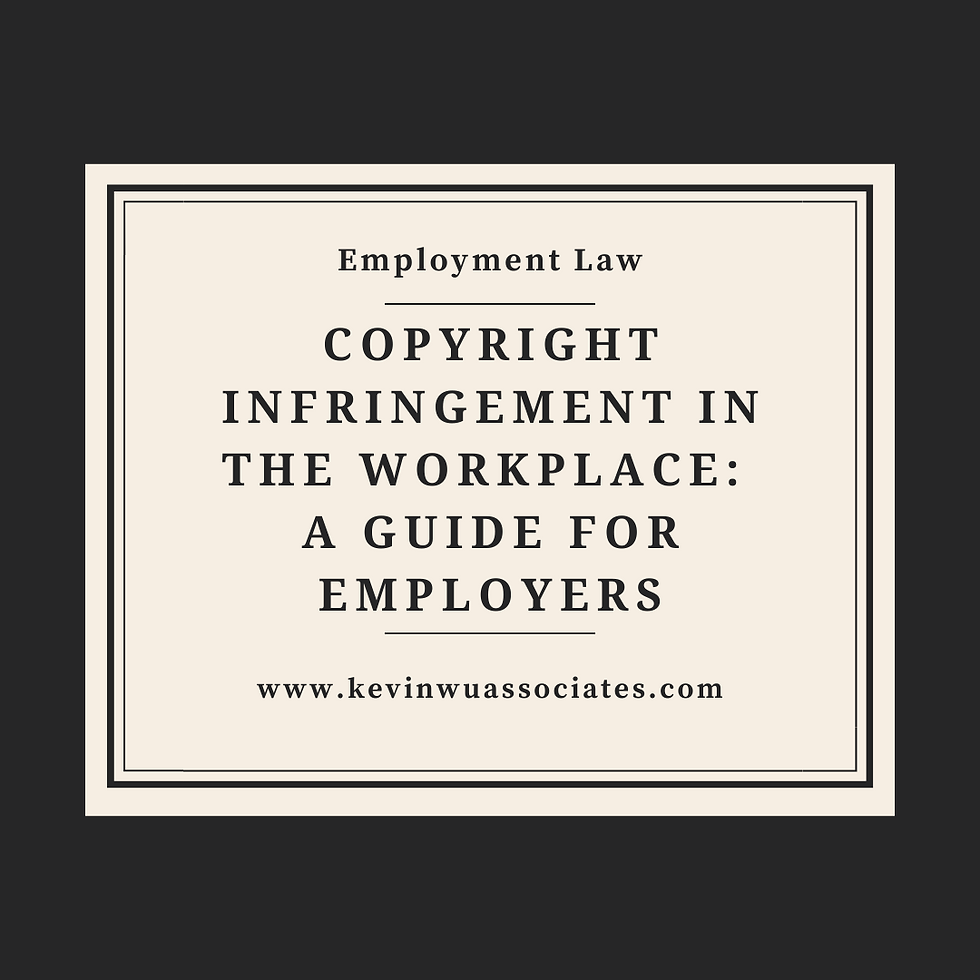Are you an Employee or an Independent Contractor?
- Kevin Wu & Associates

- Jan 10, 2022
- 4 min read
Updated: Sep 10, 2024
In recent years, employers have attempted to stray away from the usual employer-employee relationship by hiring a person as an ‘independent contractor’ via a “contract for service”. This has caused many discussions within the Courts of Malaysia as to whether these contracts for service truly reflected the relationship of an independent contractor, or whether it was an employer-employee relationship under the preface of an independent contractor. Consequently, this has resulted in a grey area as to who are deemed employees of the employer. As such, this article aims to help both employers, employees, as well as independent contractors understand the differences of these relationships to help enable contracting parties to execute the contracts as intended accordingly.
The Differences
By law, an employee is defined as someone who is engaged under a “contract of service”.[1] A contract of service is defined as “any agreement whether oral or in writing and whether express or implied, whereby one person agrees to employ another as an employee and that other agrees to serve his employer as an employee and includes an apprenticeship contract.”[2] On the other hand, an independent contractor is engaged under a “contract for service”, wherein the independent contractor shall only carry out their services as agreed in the contract for the employer and shall be remunerated upon completion of the same.
By looking at these definitions, one would assume that if an employer hires a person solely for specific services only, then the hired person would be categorized as an independent contractor. However, the situation is unfortunately not as straightforward as it seems. This is because over the years, the Courts of Malaysia tend to look further into the intention and the conduct of the contracting parties as to whether it reflected the terms of the said contract signed, by considering other sort of factors to further justify whether such a relationship is that of an independent contractor and not of an employee and vice versa.
Most of the time, the Courts of Malaysia will analyze the extent of control the employer will have during the term of the contract. The following are some of these powers that will be considered:
● The power to enforce authority onto the hired person;
● The power to determine matters on behalf of the hired person, such as the salary and / or other
forms of remuneration;
● The power to terminate services with the hired person; and
● The power to instruct the hired person.
However, the question of the employer’s power during the term of contract is not the sole determinant in distinguishing this relationship as there are many other various factors to be considered, such as but not limited to the following:
● Whether the hired person works, or retains the right to work, elsewhere;
● The premises as to where the hired person works at;
● Whether the hired person is able to hire their own helpers;
● The degree of business risks borne by the hired person;
● The degree of responsibility for investment and management borne by the hired person;
● Whether the employer has opted to pay for the statutory payments such as EPF, SOCSO, and
income tax;
● Whether and how far the hired person benefits directly from the success of the employer’s venture;
and
● Whether the contract was solely drafted to use the hired person’s own expertise in return for
remuneration of any form.
Based on the factors referred to above, the following is a simple table outlining a non-exhaustive list of the differences in a relationship between employees and independent contractors:

The Importance
The importance in knowing the differences as to whether the hired person was contracted as an employee, or an independent contractor is because there are several legal rights employees have that independent contractors do not have. For example:
● An employee will be entitled to claim for unfair dismissal under the Industrial Relations Act 1967 which is not available to an independent contractor that may solely only rely on their contractual rights.
● An employee shall be covered under the protection of the Employment Act 1965 should the employee satisfy the criteria under First Schedule, Employment Act 1965, a form of protection that will never be available to independent contractors.
Premised on this, employers will have to take close precaution to note that should the hired person share an employer-employee relationship instead of an independent contractor, the employer may then be subjected to several liabilities should the situation arises, even though the contract expressly states that the hired person was hired as an independent contractor.
Conclusion
In view of the above, employers are always encouraged to understand and make their intentions clear should they wish to hire someone as the simple labelling of an employee as an ‘independent contractor’ in the contract will not simply let one escape from the obligations and liabilities that may arise from an employer-employee relationship.
It is thus with hope that this article has somewhat helped both the employer and hired person understand these differences and have an equal level of negotiation in the terms of the contract.
[1] 1st Schedule, Employment Act 1965. [2] Section 2, Employment Act 1965.
Authored by Yap Sher Min and Caylene On
Kindly note that this legal article does not, and is not intended to, constitute formal legal advice by the Firm, instead all information, content and materials available on this site are for general informational purposes only. If readers require further clarification or legal advice, please email office@kevinwuassociates.com.




